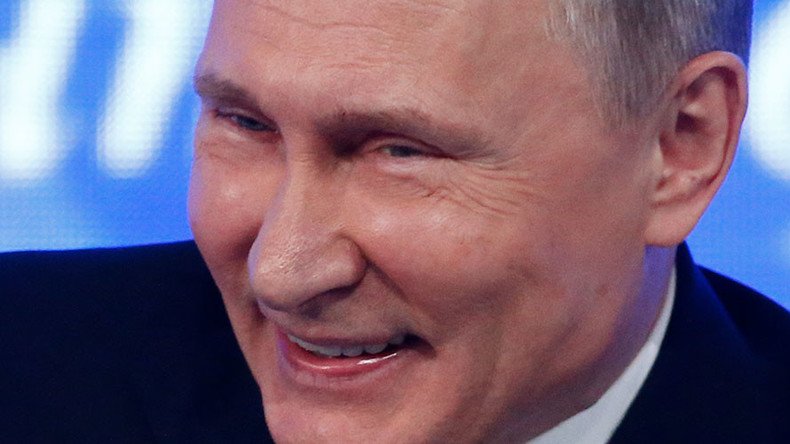How EU could really hurt Putin: Invite Russia to join the Euro

Sanctions against Russia have failed to alter the Kremlin’s policies and actually increased popular support for Vladimir Putin. Now, there are growing calls for a change of tack.
Like a lake reliant on multiple affluents, the individual headlines eventually morph into a whole. An assemblage dripping with drivel. Russia is apparently attempting to infiltrate – or interfere with – the Baltics, Germany, France, the Netherlands, Scotland, Italy, the Czech Republic, Sweden, and Finland. And all at the same time to boot. Which is pretty impressive for a country that doesn’t even boast the largest economy in Europe (that being Germany).
This follows Moscow’s alleged success in securing the US Presidency for Donald Trump and convincing millions of Brits to opt for Brexit. Not to mention how it seemingly orchestrated recent election successes in Bulgaria and Moldova for its “useful idiots.”
Nevermind the fact that the Kremlin’s soft power can’t convince the majority of Ukrainians to love it, despite practically everyone understanding the Russian language there and a great many citizens boasting direct family ties to their neighbor. We are expected to swallow how Russia is so incredibly influential that it dominates politics practically everywhere. Like an elephantine geopolitical octopus. Something even the US couldn’t manage in the late 1940’s when it controlled around half of global GDP. And was handing out interest free loans to boot.
The reason this nonsense narrative has taken hold is simple. The Western establishment – which thought it had achieved “the end of history” twenty-five years ago – is getting a severe kicking. And sustained by an absolute conviction that it oversees the sole legitimate belief system in the world – an assumption which would survive a trek through the most Byzantine hall of mirrors – it’s looking for somebody else to blame. Indeed, at this stage, Popes from the Middle Ages would be impressed by Eurocrats’ resolute belief in their infallibility.
'Fake news vaccine' - 'idiot's' suggestion that won't change what people don’t like about the elites (Op-Edge) https://t.co/ebdREyD97Xpic.twitter.com/py0jWPBehp
— RT (@RT_com) January 27, 2017
Bad Guy
Thus, these mandarins have chosen the Kremlin as their bogeyman. In part, because it has been the traditional enemy of European liberals. Additionally, the fact that people of a certain age – i.e. most current leaders and opinion formers – grew up fearing its Soviet incarnation makes it an easier sell. And Russia has obliged them by adopting increasingly conservative domestic policies and consistently re-electing Vladimir Putin, who has become the sworn enemy of the entrenched elite. Largely because he reversed Boris Yeltsin’s policy of bending over backwards to appease the West.
But most importantly, blaming Russia means our betters don’t need to take any responsibility for their own shortcomings. Because, why would they conduct thorough investigations into why Americans rejected Hillary Clinton or the Brits decided to divorce from Brussels when they can blame Moscow? After all, the latter path allows the avoidance of accountability.
READ MORE: EU expands task force aimed at combatting alleged Russian propaganda
Instead, Obama sanctions Russia for “hacking.” Without a shred of proof. And then pundits wonder why Putin’s approval ratings remain sky-high, even though this country has just endured a pretty nasty recession and living standards have stalled for most, and decreased for many. In other words, the perfect conditions exist for popular discontent against the government.
Senseless Helpers
Yet, rather than weakening Putin’s administration, the penalties bolstered it. And the negative propaganda assault against Russia has encouraged a siege mentality here. And, of course, like any proud people who feel victimized, the Russians have rallied around their leader, who is now popular even with younger people that largely disliked him when I first moved here seven years ago.
So, it’s fair to say how Western powerbrokers unwittingly pulled off a considerable achievement. Their cack-handed policy towards Russia has made the government of a country experiencing serious economic difficulties more secure than it was a decade ago, when the economy was growing at around eight percent annually. And it takes a profoundly misguided policy to produce this sort of result.
Thus, imagine you were in Brussels right now advising Donald Tusk? Or across in Berlin, at Angela Merkel’s desk? The previous desire to extend NATO and EU power projection up to Russia’s borders has failed, Ukraine is a bloody mess, and the two aforementioned institutions are facing existential crises. Meanwhile, attempts to make Putin pay for stymying their dreams have backfired.
Given how these officials believe the decline of the “liberal order” is entirely the Kremlin’s fault, and their own decisions have had no part to play, the only solution is to weaken Putin’s position. And sanctions clearly aren’t working.
Just imagine... if Russian troops were amassed on America's borders (Op-Edge by @NeilClark66) https://t.co/LUMvfRlJrC
— RT (@RT_com) January 25, 2017
Different Strokes
There are a few options here. Eurocrats could pump billions of euros into Ukraine, bolstering the Maidan regime there by spreading so much cash around that everyone could steal something. Not just the ruling classes. Indeed, if Ukraine became a success – which is long shot, in fairness – it would undermine the Kremlin by showing how submission to the West means oodles of filthy lucre. However, this is a costly notion and austerity-loving Germans are unlikely to approve.
Another scheme might involve dangling visa-free travel for Russians if they’d agree to vote for someone else in the 2018 election, but the Dutch won’t even countenance open borders for “loyal” Ukrainians. And, anyway, easier movement would only really appeal to the middle classes in Moscow and St Petersburg, who were already pretty hostile to Putin before the imposition of sanctions.
New York Times admits Yanukovich was right not to sign #Ukraine-EU deal (Op-Edge by @27khv) https://t.co/Fe4OkTnAhK
— RT (@RT_com) December 27, 2016
Some in Brussels think increased splurging on media messaging could yield dividends, but, given how EU states already outspend Moscow by huge amounts, this is a pipe-dream. For all the fear-mongering about Russian television and web services, the entire state broadcasting budget – both domestic and foreign – is less than one third of what the British alone spend on the BBC network.
Bearing all this in mind, there seems to be only one way Eurocrats can undermine Putin. One that, I will admit, is somewhat counterintuitive and probably unfathomable to Brussels – how about a formal invitation for Russia to replace Britain in the European Union, on condition that it also joins the Euro? Because in the (admittedly unlikely) event the Kremlin would accept such entreaties, Putin would be gone in short order. After all, look at how successful the Euro has been at destroying living standards across Europe, and the hopes and dreams of millions? From Athens to Dublin, it has wrought damage that the EU’s biggest enemies could only have dreamed of.
‘#Euro could collapse in the coming year, year and a half,’ #Trump’s pick for EU ambassador predicts https://t.co/rVDLcjCB7E
— RT (@RT_com) January 27, 2017
The statements, views and opinions expressed in this column are solely those of the author and do not necessarily represent those of RT.













